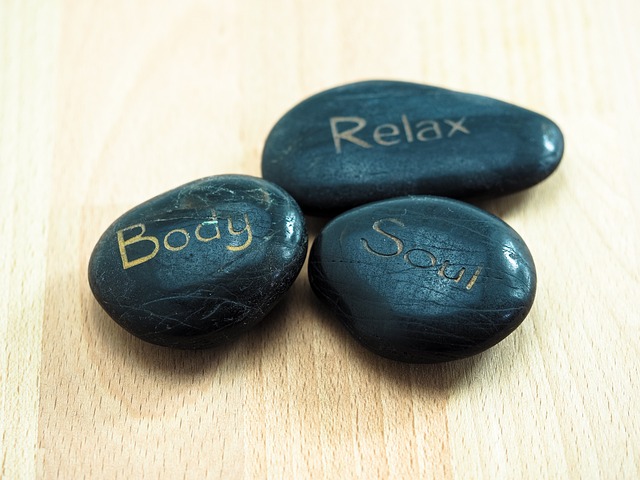Holistic wellness programs combat chronic stress through mindfulness techniques like meditation, deep breathing, and gratitude journaling, combined with lifestyle adjustments such as balanced diets, exercise, and sleep. These practices promote mental and physical health, reduce anxiety, improve sleep, and enhance resilience to stress hormones. By addressing root causes rather than just symptoms, these programs offer a comprehensive solution for managing stress in today's fast-paced world, leading to improved overall well-being.
Stress management is a cornerstone of maintaining optimal mental and physical health. In today’s fast-paced world, understanding how stress impacts our well-being is crucial. This article explores effective techniques for managing stress holistically. We’ll delve into lifestyle adjustments, the power of mindfulness, relaxation techniques, and the benefits of holistic wellness programs. By adopting these strategies, you can foster a balanced and resilient mindset, enhancing your overall quality of life. Discover how to navigate life’s challenges with grace and composure.
- Understanding Stress and its Impact on Holistic Wellness
- Lifestyle Adjustments for Effective Stress Management
- The Role of Mindfulness and Relaxation Techniques
- Exploring Holistic Wellness Programs: A Comprehensive Approach
Understanding Stress and its Impact on Holistic Wellness

Stress is a natural response that can be beneficial in small doses, but chronic or prolonged stress can have significant negative impacts on both mental and physical health. When left unmanaged, it can disrupt various aspects of holistic wellness, encompassing not just emotional and psychological well-being but also physical vitality and social connections.
Understanding the sources of stress is a crucial first step. Holistic wellness programs often emphasize mindfulness practices, such as meditation and deep breathing exercises, to help individuals recognize and manage stressors. By integrating these techniques into daily routines, people can foster resilience and enhance their ability to navigate life’s challenges, ultimately promoting a more balanced and fulfilling sense of holistic wellness.
Lifestyle Adjustments for Effective Stress Management

Incorporating lifestyle adjustments is a cornerstone of effective stress management, encompassing various holistic wellness programs designed to promote mental and physical health. A balanced diet, regular exercise, and adequate sleep form the foundation of these programs. Nutritious foods rich in vitamins and minerals not only fuel your body but also enhance cognitive function, boosting resilience against stress hormones. Engaging in physical activities like yoga, meditation, or even a brisk walk releases endorphins, nature’s mood elevators, while reducing levels of cortisol, the stress hormone. Adequate sleep is equally vital, allowing your mind and body to rest, repair, and rejuvenate, thereby enhancing overall well-being.
Additionally, mindfulness practices such as deep breathing exercises, progressive muscle relaxation, and keeping a gratitude journal play significant roles in holistic wellness programs. These techniques foster present-moment awareness, helping individuals detach from stressful thoughts and emotions. By cultivating a sense of gratitude, people can shift their focus towards life’s positives, enhancing emotional resilience and reducing stress levels. Integrating these lifestyle adjustments into daily routines empowers individuals to take charge of their mental and physical health, ultimately leading to a more balanced and fulfilling life.
The Role of Mindfulness and Relaxation Techniques

Mindfulness and relaxation techniques play a pivotal role in holistic wellness programs, offering powerful tools to manage stress and promote mental and physical well-being. These practices encourage individuals to focus on the present moment, cultivating a sense of calm and clarity. By engaging in activities like meditation, deep breathing exercises, or yoga, one can reduce the body’s stress response, lowering cortisol levels and promoting relaxation.
Such techniques enhance self-awareness, enabling individuals to recognize and accept their thoughts and emotions without judgment. This practice is fundamental in navigating stressful situations as it allows for a more controlled reaction rather than an impulsive one. Incorporating mindfulness into daily routines can lead to improved sleep quality, reduced anxiety, and enhanced overall resilience to stress, contributing significantly to holistic wellness.
Exploring Holistic Wellness Programs: A Comprehensive Approach

In today’s fast-paced world, stress has become an all too common companion. Holistic wellness programs offer a comprehensive approach to managing stress by addressing not just symptoms, but the root causes affecting both mental and physical health. These programs often incorporate a blend of techniques such as mindfulness meditation, yoga, nutritional counseling, and stress management coaching. By taking a holistic view, individuals can experience deeper relaxation, improved resilience, and enhanced overall well-being.
Instead of treating isolated symptoms, these programs encourage a balanced lifestyle that nurtures the mind, body, and spirit connection. With a focus on prevention and self-care, participants gain valuable tools to navigate life’s challenges with greater ease. By embracing holistic wellness practices, individuals can reclaim their sense of calm, vitality, and control in a stressful world.
Stress is a universal challenge, but managing it effectively is key to maintaining both mental and physical health. By understanding the impact of stress on our well-being and adopting lifestyle adjustments, mindfulness practices, and exploring holistic wellness programs, we can forge a path towards a calmer, healthier existence. These comprehensive techniques empower individuals to navigate life’s stressors, fostering resilience and enhancing overall holistic wellness.
